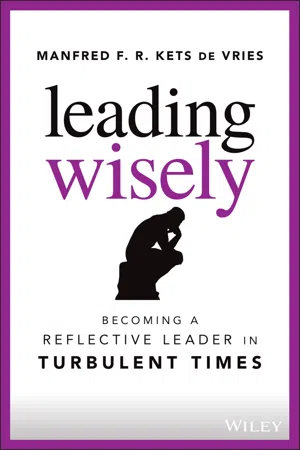
Leading Wisely
Becoming a Reflective Leader in Turbulent Times
- English
- ePUB (mobile friendly)
- Available on iOS & Android
About This Book
Discover true leadership with this actionable guide from a world renowned leadership expert, psychoanalyst, and executive coach
In Leading Wisely: Becoming a Reflective Leader in Turbulent Times, renowned leadership expert, psychoanalyst and executive coach Manfred Kets De Vries delivers an insightful and unique exploration of what it means to lead with wisdom. The book demonstrates that exclusive reliance on knowledge, data, and information yields a superficial leadership style lacking in depth and discernment. What's more important in the wisdom equation is possessing humility, judgment, empathy, compassion, and night vision.
With eleven chapters full of anecdotes and tales from a variety of spiritual and cultural traditions that enrich and lend a deeper significance to the choices we make as leaders and members of organizations, Leading Wisely provides readers with:
- A thorough exploration of dealing with negative—but entirely natural motivations, like envy and greed
- An emphasis on the Golden Rule—treating others as we like to be treated ourselves
- An opportunity to be courageous—to consciously and intentionally pick our battles, saving energy for what really matters
- Lessons on how to listen intently and actively, truly hearing what our colleagues, friends, family, and followers are saying before reacting
- Finding happiness within ourselves
-
Leading Wisely: Becoming a Reflective Leader in Turbulent Times is a startlingly incisive book, filled with messages that make the book required reading for anyone in a position of leadership or power. It also belongs in the libraries of well-being and health practitioners who frequently deal with businesspeople as clients or patients.
Frequently asked questions
1
Not knowing
Knowledge is learning something new every day. Wisdom is letting go of something every day.—Zen proverb
The fool doth think he is wise, but the wise man knows himself to be a fool.—William Shakespeare
Not knowing
According to Plato, the renowned Greek philosopher Socrates went to this temple of Apollo in ancient Thebes and asked the Pythia, the Oracle, ‘Who is the wisest person in Athens.’ The oracle replied, ‘It is you.’‘That is impossible,’ said Socrates, ‘because I am aware that I know nothing.’‘That,’ said the Oracle, ‘is exactly why you are the wisest person in Athens.’
A wise old man, a guest of the king, spent his days dressed magnificently, eating the greatest delicacies at the king's table. The advisers sought his advice and the powerful laughed heartily at his jokes, while the relatives of the king showered him with gifts.A party of young, arrogant noblemen met the old man one day amidst the lush trees within the royal garden and challenged him about his wisdom: ‘Now tell us Seeker of the Truth, given all the things you know, how many grains of sand would fit in this bucket?’‘My apologies, your fine noblemen, I haven't the faintest idea.’‘Well, how disappointing! But let's ask you something else. Can you tell us this simple thing: Why can you see in a mirror your right and left eye and ear reversed in the reflection but not your face upside down?’‘If I only knew, you priceless offspring of your eminent fathers.’But the young noblemen didn't know how to stop pestering the wise old man. ‘Then, tell us at the least, what is the meaning of life?’‘As far as that's concerned, I only know that I don't know, your very honorable people.’At this point, the young noblemen exclaimed: ‘You don't know this, and you don't know that! Why then are you, silly, old man, fed and dressed and honored at the royal tables as if you were the wisest of all people?’‘Oh, your noble people,’ replied the old man, ‘I am dressed in silk and fed with good food only for the little that I know. For if I were to be rewarded for what I don't know, all the treasuries of the world put together would not be sufficient.’
Defining wisdom
Once upon a time there was a king who offered an award to the artist who could create the painting that would best symbolize the idea of wisdom. Not surprisingly, the competition created great excitement in the kingdom. Many artists were...
Table of contents
- Cover
- Table of Contents
- Title Page
- Copyright
- Preface
- 1 Not knowing
- 2 Beyond book knowledge
- 3 Wisdom and sorrow
- 4 The Golden Rule
- 5 Forgiveness
- 6 Envy
- 7 Greed
- 8 Listening
- 9 Choose your battles wisely
- 10 Courage
- 11 Happiness
- 12 Conclusion
- About the Author
- Index
- End User License Agreement